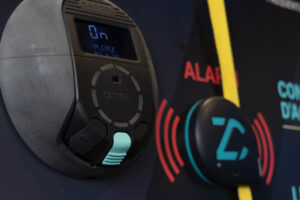
Co-Aps: to manage passenger density on public transport during the pandemic
December 3, 2020
Modular, customizable exoskeletons for patients with neurological disorders
December 18, 202011/12/2020
The project START (a stable and resilient ATM by integrating robust airline operations into the network) has begun. This is a European project that combines big data and artificial intelligence to develop algorithms that can optimize the air traffic network when there are storms. These meteorological phenomena, which may be accompanied by hail and electrical activity, are difficult to predict. We know that they may appear in a wide area, but it is difficult to determine precisely when or where the centre of the storm will occur. The project will improve the safety and punctuality of flights and will reduce economic losses for airlines that are associated with delays and cancellations.
Search algorithms will optimize the air transport network in terms of resilience (the system’s recovery capacity) when faced with this type of disruptive phenomena. In the project, convective storms will be analysed, typically cumulonimbus, which are very energetic and dangerous to an aeroplane in flight. In addition to heavy rain, these storms often involve hail, turbulence and electrical activity, and can block an airport or large corridors of air space.

The system will consider other factors that could cause a certain degree of uncertainty in the planning of flights, such as the models of aircraft in use, their weight and load, gusts of wind, or attempts to take off or land.
Methodologically, the project requires a multidisciplinary approach. To characterize the uncertainty of all elements of air traffic, the scientists use artificial intelligence and an epidemiological model to simulate how delays in the system are propagated through the network. In addition, Big Data (data science) is used to investigate how large volumes of information can be analysed continuously, and to develop the aforementioned flight optimization algorithms.
Participants in the START project include the research group Intelligent Communications and Avionics for Robust Unmanned Aerial Systems (ICARUS). The project is coordinated by the University Carlos III of Madrid (UC3M) and other participants include partners in five European countries: Boeing Deutschland (Germany), the German Aerospace Center (DLR), the French Civil Aviation University (France), the flight planning company Flightkeys (Austria), and the Istanbul Technical University (Turkey). It is funded by the European Commission and will end in 2022.
Technology
You want to know more?
Related Projects
- The Visualisation, Virtual Reality and Graphic Interaction Research Group (ViRVIG) at the Universitat Politècnica de Catalunya - BarcelonaTech (UPC) has participated in the XR4ED project, an initiative that connects the educational technology (EdTech) and Extended Reality (XR) sectors, with the aim of transforming learning and training across Europe.
- The inLab FIB at the UPC has collaborated with Lizcore® for the development of a proof of concept based on artificial intelligence to improve safety in climbing with autobelay devices. The system allows the automatic and accurate detection of risk situations before starting a route.
- Researchers from the Centre for Image and Multimedia Technology of the UPC (CITM) and from the DiCode research group (Digital Culture and Creative Technologies Research Group) of the Universitat Politècnica de Catalunya – BarcelonaTech (UPC) have worked on the project The Eyes of History, an initiative of the Catalan Agency for Cultural Heritage that offers an immersive view of Catalan cultural heritage. It is especially aimed at the first and second cycles of secondary education and was created to bring heritage into the classroom. Its goal is to bring the history and monuments of Catalonia closer in a vivid and innovative way, using tools such as virtual reality and new museographic narratives.
- City and Play is a social action project coordinated by researchers from the Centre for Image and Multimedia Technology (CITM) and the DiCode research group (Digital Culture and Creative Technologies Research Group) of the Universitat Politècnica de Catalunya – BarcelonaTech (UPC), the Universitat Oberta de Catalunya (UOC) and the University of Barcelona (UB), and funded by Barcelona City Council. The aim of the project is to promote civic competences and reflection on the urban environment among adolescents through the creation of an open framework that uses methodologies based on play, co-creation and storytelling.




